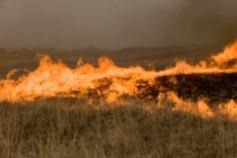Weekly, John Weir, an associate extension specialist for Natural Resource Ecology and Management at Oklahoma State University, offers his expertise. This is a part of the weekly series known as the "Cow-Calf Corner" published electronically by Derrell Peel. Today, he talks about wildfire preparedness.

Wintertime in Oklahoma brings a lot of changes to the land. The dormant season is the driest time of the year rainfall wise, with December through February normally receiving the least amount of rain than the other months. Then the drying and curing of the past summers growth of forage adds to conditions favorable for wildfires. Typically, most wildfires in the state occur December through March due to these dry conditions, but wildfires can happen any month of the year. Being prepared for a wildfire is something that we can do year-a-round, just a small amount of preparation can make a difference if you are ever faced with an oncoming wildfire.
One of the first things you should do is check with your insurance agent and determine what is covered and if you have enough coverage in case you were to receive damages from a wildfire. Then you need to start looking around your home, barns and other structures to see if there is anything that can be done to reduce the risk around those structures. Make sure all the tall grass is mowed short around them, remove any volatile trees, like cedars, that may be growing nearby. Also make sure to remove all flammable items, such as wood piles, from around buildings as well.
Equipment should be stored in areas that will not burn, like gravel or bare ground areas, if those are not available, continually mow or graze storage areas short to keep fire intensity down. Also, when you store equipment for the year make sure to clean and remove all excess vegetation and oils from the outside. Next think about hay storage, store hay in bare ground areas, and don't store all of your hay in one area. A lot of times we store hay due to convenience, but this may not be the safest place to have it. Remember many insurance companies will only insure a haystack to certain value or amount of hay. So, check your insurance policy and think about where you store your hay.
Click here to see more...